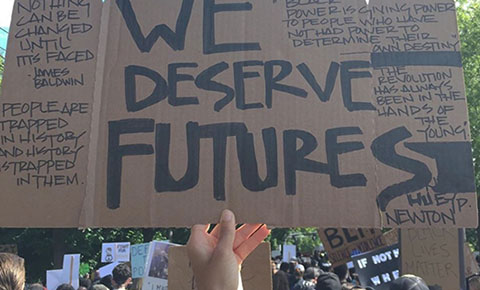Why STEM Education Shouldn’t Return to ‘Normal’

Young people would be better served by STEM education that teaches them to deal with the moral and ethical complexity of problems like pandemics and climate change, University of Illinois at Chicago and Northwestern University School of Education and Social Policy education researchers argued in Truthout.
Most school curricula rarely question the role of STEM disciplines – science, technology, engineering, and math – in war, environmental injustice, or public health, the authors wrote. A broader view, one that values the cultures and histories of students and acknowledges the moral issues associated with STEM, would better prepare students for today’s world.
“The current COVID-19 pandemic exposes the United States — the nation often upheld as the leader in scientific innovation — as unable (or unwilling) to use its vast resources to care for its people at the most basic human level,” they wrote. “Yet the country rapidly mobilized its military and police to repress outrage against deep, persistent and violent anti-Blackness.”
The researchers expect that “efforts to restore the damaged global image of the U.S. will double down on an enduring paradigm which positions STEM education as operating in service of US economic and military supremacy.
"We see this “return to normalcy” as a failure of leadership in this moment," they wrote. "It assumes that the status quo was desirable or healthy for students and communities and represents a massive missed opportunity to reimagine the deeper purposes of STEM education, and education more broadly.”
The opinion piece, titled “In an Era of Pandemic and Protest, STEM Education Can’t Pretend to Be Apolitical” was coauthored by Daniel Morales-Doyle (MS05), assistant professor of science education at the University of Illinois at Chicago, Shirin Vossoughi, assistant professor of learning sciences; Sepehr Vakil, assistant professor of learning sciences; Megan Bang (PhD09) professor of learning sciences and psychology and senior vice president of the Spencer Foundation.
The authors imagine a world in which, "instead of regurgitating the work of Newton, Darwin or Avogadro, high school students were regularly challenged to think about health, food production, energy and transportation as complex, systemic challenges with social and scientific components.
“Thinking about such locally relevant problems as embedded in global systems would better equip learners to deal with pandemics and racial inequities, and better approximate the complex problem-solving required of STEM professional.
"In this moment of great peril and possibility, we have the rare opportunity to reinvent teaching and learning toward racial, ecological and global justice," they conclude." Let’s match the political clarity of protesters on the streets, and STEM professionals reexamining the character of their own disciplines, to remake STEM learning as not merely a technical and economic pursuit, but a moral and ethical one.”